http://www.senado.gov.br/noticias/agencia/internacional/en/not_1301.aspx
Brazil should invest in studying China, India and South Africa, according to experts who joined a public hearing on foreign policy of the three countries promoted by the Committee on External Relations and National Defense, on Monday (16). The hearing is part of a debate cycle named Trends of Brazilian Foreign Policy (2011-2012).
Professor Oliver Stuenkel, from Getúlio Vargas Foundation of São Paulo, suggested that Brazil promotes an “essential strategic reorientation” to approach the new emerging countries, and specially China, which has already become Brazil’s main trade partner.
He regretted that China is not much studied in Brazil, while in the United States there are 120 China study groups. At the same time, he highlighted, there are only 11 Brazilian diplomats in China.
“There are more Brazilian diplomats in Rome than in Beijing. It’s easier to live in Rome than in Beijing or New Delhi. Our students need to go to China and India, but there are no scholarships. A research center in China has just hired 20 researchers only to study Brazil. “China is like the beautiful girl with whom everyone wants to dance, but Brazil has arrived late to the ball,” he said.
The same way, professor Ubiratan Castro de Araújo, from Pedro Calmon Foundation, asked for closer relations with Africa. He supported recent initiatives of Brazilian foreign policy in relation to the continent, as the forgiveness of African countries’ debts and cooperation in areas such as agriculture and medicine production. However, he highlighted the need of a closer approach between Brazilian and African societies.
“Brazilian presence in Africa is still very limited. Brazil is forming a black elite and we need to have more contact people to people, but we don’t have scholarships or a push up in order to take Brazilian young people into this kind of contact,” he regretted.
Among the world great current tendencies, pointed out Professor Severino Bezerra Cabral Filho, from the Brazilian Institute for China and Asia-Pacific Studies, is the arrival of what he called “emerging giants “, as Brazil and China. In his opinion, the world power structure tends to transform itself, with the emergency of a multipolar system.
“We need to take lessons from the current global scene. There won’t be a way of not anticipating these countries’ vital interests in this third global wave. China is a big country in mid Eurasia, we are a big southern country of the West. Brazil and China have an important role to perform in this new multipolar order that is coming,” he predicted.
As he showed a picture of the Brics’ leaders during their last summit, held in the Chinese city of Sanya, on April 14, professor Ricardo Sennes, from the University of São Paulo, highlighted the group’s positive aspects, as the “rare ethnical diversity”. However, he recalled that the emerging of these countries still occurs in a global framework of “clear power differences”.
“In military power, the capacity to influence in global scale is still very concentrated. The same happens with innovation,” he recalled.
During the debate, senator Cristovam Buarque (PDT-DF) mentioned the importance of the debates which will take place in Rio+20 Conference on the environment and development, scheduled for next year. He said he identifies four common frailties to the Brics member countries: social inequality, political frailty (as an example, the “massive power” of the Chinese Communist Party), the bad public education conditions and the risks to the environment especially because of the Chinese and Indian growth.
The chairman of the committee, senator Fernando Collor (PTB-AL), said he is “sure” that, in Rio+20, ”we will be much closer to a consensus that will lead us to save the planet”. Whereas, senator Pedro Simon (PMDB-RS) showed his expectation of the United Nations (UN) strengthening, through the inclusion in its Security Council of emerging countries like Brazil, India and South Africa.
Read also:
Emerging powers remain divided on R2P and RwP









